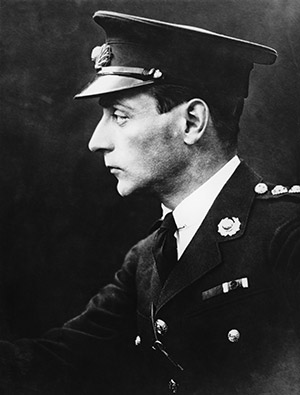The author of Whisky Galore played an
active role in the Great War, experiencing both the horror of the
Dardanelles in 1915 and the intrigues of wartime Athens. Yet his
diplomatic ham-fistedness forced his premature exit. Richard Hughes
explains.
 Compton Mackenzie in uniform, 1917. Getty Images/Hulton ArchiveAt
the head of a flotilla of steamships the novelist Compton Mackenzie
surveyed the Aegean Sea, or at least that part of it which was his
domain. ‘Then he was in his glory’, wrote his biographer, Andro
Linklater. It was December 1916 and Mackenzie had, within two years,
transformed himself into the leader of a highly effective espionage
network that had succeeded in promoting the writ of Britain and her
allies within the cauldron that was the Greek political system in the
First World War. His considerable achievements were admired and
distrusted in equal measure and, while now he appeared at the zenith of
his authority and influence, within a year he would be sailing home to
London and the literary salons from whence he had sprung.
Compton Mackenzie in uniform, 1917. Getty Images/Hulton ArchiveAt
the head of a flotilla of steamships the novelist Compton Mackenzie
surveyed the Aegean Sea, or at least that part of it which was his
domain. ‘Then he was in his glory’, wrote his biographer, Andro
Linklater. It was December 1916 and Mackenzie had, within two years,
transformed himself into the leader of a highly effective espionage
network that had succeeded in promoting the writ of Britain and her
allies within the cauldron that was the Greek political system in the
First World War. His considerable achievements were admired and
distrusted in equal measure and, while now he appeared at the zenith of
his authority and influence, within a year he would be sailing home to
London and the literary salons from whence he had sprung.Compton Mackenzie’s war had not begun well. In 1914 his application for a commission in the Seaforth Highlanders had been rejected with a War Office official’s dismissive comment: ‘We don’t want married subalterns of 31. Your job is to keep us amused by writing books.’ Indeed writing books had served Mackenzie well. Today it is hard to appreciate just how significant a novelist he was. While his tally of books in 1914 was just three, they had been greeted with critical acclaim and huge sales. In particular his latest, Sinister Street, a semi-autobiographical account of his formative years, had struck a resonance with the generation who were now providing the fodder for a destructive war. He was admired by young contemporary writers such as Ford Madox Ford and F. Scott Fitzgerald, as well as doyens like Henry James, who famously listed Compton Mackenzie as one of the four leading novelists of his generation. But, in August 1914, with the First World War underway, Mackenzie’s creative juices seemed strangely to have dried. His new novel, Guy and Pauline, was causing him difficulties. His publisher suggested he ‘go and find somewhere nice and quiet where you can write books’. For a while he did just that, returning to a favourite haunt, Capri. But the languid days in the sun were to be short-lived. An admirer of his work, Sir Ian Hamilton, commander of the Mediterranean Expeditionary Force, hearing of his frustration at being rejected for a commission, used his position to find him a post. Mackenzie was gazetted as a lieutenant in the Royal Marines and swiftly became a member of General Hamilton’s staff aboard HMS Arcadia. The timing was fortuitous, for Hamilton had been placed in command of the forthcoming attack on Turkey in the Dardanelles; plans were underway for landings at Gallipoli.
Read the full text of this article in the current issue of History Today, which is out now in newsstands and on the digital edition for iPad, Android tablet or Kindle Fire.
No comments:
Post a Comment